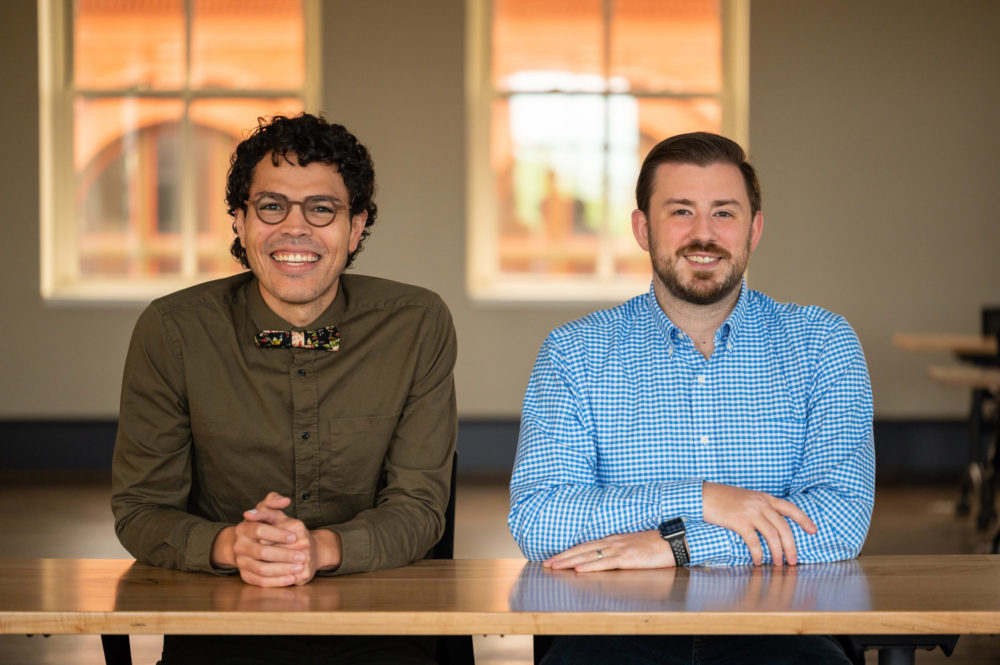Data for good is evolving.
The Delaware Data Innovation Lab (DDIL) launched in the fall of 2020 after the Wilmington data science company CompassRed received a $2 million New Castle County CARES Act grant. The goal: put analytics to use in tracking the impact of COVID-19. But from the start, the team also wanted to evolve it into a standalone, self-sustaining initiative supported by member organizations benefiting from its data and insight.
It took less than a year to reach that point. Over the summer, former CompassRed lead data scientist Ryan Harrington moved to DDIL full time as its associate director of strategy and operations, and Héctor Maldonado-Reis, one of DDIL’s first fellows, was hired as its associate director of research, development and analytics.
Compass Red and DDIL are still geographically close, both using space at CSC Station, but are now entirely separate entities, as planned.
“We use CompassRed as a vendor when need be to augment things,” said Harrington, “but it’s a totally separate nonprofit organization.”
Some of the the six projects DDIL announced in December, like the FAFSA Data Dashboard with partner TeenSHARP, have been completed. A couple are ongoing, and new projects and partners are being sought.
“The community well-being index has continued the whole time and evolved, and we’ll be looking to launch an alpha program with other community partners,” Harrington said. “We’re about to pick up work with housing insecurity again. We spent a lot of time on that work, which Héctor led, evaluating emergency rental assistance.”

DDIL’s more recently launched projects are with the State of Delaware.
“One of our projects is with the Delaware Health and Information Network, leveraging data that has never been leveraged before for any type of information gathering to learn about the communities,” Maldonado-Reis said. “We’re adding a special component so that rather than a ZIP code, we added the label for census tract, which is smaller so we get to capture the neighborhoods. Not only are we integrating health information data, now we’re learning about the people that are being treated in those spaces, and that creates opportunities to really learn about their well being and what other things are missing in their healthcare.”
The project’s three pillars are education, housing and health.
Because of the nature of the data, the Delaware Health and Information Network data will never be publicized outright, Harrington said. But for most DDIL projects, sharing the data is something they plan to do as the DDIL website evolves.
“We’re looking to better highlight the case studies,” he said. “In terms of actually sharing the data, one of our major ethos is openness, so we’re looking to build out a repository that all of our work is open, all of the data that supports the work is open, within some bounds. We say it’s a bias toward transparency.”
Community members can also learn more about using data through DDIL’s meetup, The Data Lab. Events are currently hybrid, with limited in-person attendance at CSC Station that will be streamed live for virtual attendees. The next event, Perspectives on Productizing Machine Learning at Adobe, will be on Sept. 23.
While DDIL’s fellowship program, currently run by Maldonado-Reis, is still developing, the org is continuing to offer opportunities for emerging data scientists.
“The way we’re positioning it now is that it’s a year long fellowship position where often times the people are in Ph.D. programs or thinking about applying to Ph.D. programs and are able to spend dedicated time working on those types of projects,” Harrington said
“The fellowship, outside of the job opportunity that it creates, is also a professional development opportunity for Delaware,” Maldonado-Reis added. “Part of it is that we train a data scientist, but, also, we train a data scientist in our space, which is a nuance of its own.”
If you’re interested in learning more about a fellowship or a partnership for a data project, you can contact Harrington and Maldonado-Reis via the DDIL website.







